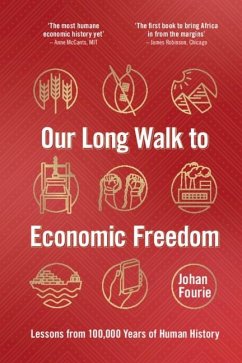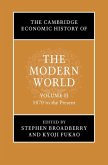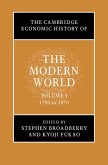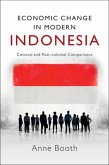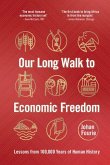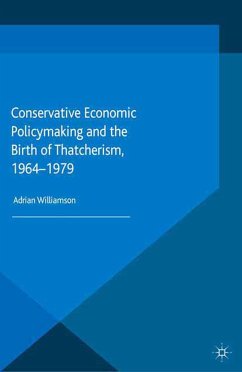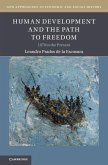Our Long Walk to Economic Freedom (eBook, PDF)
Lessons from 100,000 Years of Human History


Alle Infos zum eBook verschenken

Our Long Walk to Economic Freedom (eBook, PDF)
Lessons from 100,000 Years of Human History
- Format: PDF
- Merkliste
- Auf die Merkliste
- Bewerten Bewerten
- Teilen
- Produkt teilen
- Produkterinnerung
- Produkterinnerung

Hier können Sie sich einloggen

Bitte loggen Sie sich zunächst in Ihr Kundenkonto ein oder registrieren Sie sich bei bücher.de, um das eBook-Abo tolino select nutzen zu können.
Our Long Walk to Economic Freedom is an entertaining and engaging guide to global economic history told for the first time from an African perspective. In thirty-five short chapters Johan Fourie tells the story of 100,000 years of human history spanning humankind's migration out of Africa to the Covid-19 pandemic. His unique account reveals just how much we can learn by asking unexpected questions such as 'How could a movie embarrass Stalin?', 'Why do the Japanese play rugby?' and 'What do an Indonesian volcano, Frankenstein and Shaka Zulu have in common?'. The book sheds new light on urgent…mehr
- Geräte: PC
- mit Kopierschutz
- eBook Hilfe
- Größe: 3.46MB
- FamilySharing(5)
![Cambridge Economic History of the Modern World: Volume 2, 1870 to the Present (eBook, PDF) Cambridge Economic History of the Modern World: Volume 2, 1870 to the Present (eBook, PDF)]() Cambridge Economic History of the Modern World: Volume 2, 1870 to the Present (eBook, PDF)94,95 €
Cambridge Economic History of the Modern World: Volume 2, 1870 to the Present (eBook, PDF)94,95 €![Cambridge Economic History of the Modern World: Volume 1, 1700 to 1870 (eBook, PDF) Cambridge Economic History of the Modern World: Volume 1, 1700 to 1870 (eBook, PDF)]() Cambridge Economic History of the Modern World: Volume 1, 1700 to 1870 (eBook, PDF)94,95 €
Cambridge Economic History of the Modern World: Volume 1, 1700 to 1870 (eBook, PDF)94,95 €![Economic Change in Modern Indonesia (eBook, PDF) Economic Change in Modern Indonesia (eBook, PDF)]() Anne BoothEconomic Change in Modern Indonesia (eBook, PDF)21,95 €
Anne BoothEconomic Change in Modern Indonesia (eBook, PDF)21,95 €![French Economy in the Twentieth Century (eBook, PDF) French Economy in the Twentieth Century (eBook, PDF)]() Jean-Pierre DormoisFrench Economy in the Twentieth Century (eBook, PDF)19,95 €
Jean-Pierre DormoisFrench Economy in the Twentieth Century (eBook, PDF)19,95 €![Our Long Walk to Economic Freedom (eBook, ePUB) Our Long Walk to Economic Freedom (eBook, ePUB)]() Johan FourieOur Long Walk to Economic Freedom (eBook, ePUB)14,95 €
Johan FourieOur Long Walk to Economic Freedom (eBook, ePUB)14,95 €![Conservative Economic Policymaking and the Birth of Thatcherism, 1964-1979 (eBook, PDF) Conservative Economic Policymaking and the Birth of Thatcherism, 1964-1979 (eBook, PDF)]() Adrian WilliamsonConservative Economic Policymaking and the Birth of Thatcherism, 1964-1979 (eBook, PDF)97,95 €
Adrian WilliamsonConservative Economic Policymaking and the Birth of Thatcherism, 1964-1979 (eBook, PDF)97,95 €![Human Development and the Path to Freedom (eBook, PDF) Human Development and the Path to Freedom (eBook, PDF)]() Leandro Prados de la EscosuraHuman Development and the Path to Freedom (eBook, PDF)17,95 €
Leandro Prados de la EscosuraHuman Development and the Path to Freedom (eBook, PDF)17,95 €-
-
-
Dieser Download kann aus rechtlichen Gründen nur mit Rechnungsadresse in A, B, BG, CY, CZ, D, DK, EW, E, FIN, F, GR, HR, H, IRL, I, LT, L, LR, M, NL, PL, P, R, S, SLO, SK ausgeliefert werden.
- Produktdetails
- Verlag: Cambridge University Press
- Erscheinungstermin: 30. Juni 2022
- Englisch
- ISBN-13: 9781009228473
- Artikelnr.: 66177791
- Verlag: Cambridge University Press
- Erscheinungstermin: 30. Juni 2022
- Englisch
- ISBN-13: 9781009228473
- Artikelnr.: 66177791
- Herstellerkennzeichnung Die Herstellerinformationen sind derzeit nicht verfügbar.
African economic historians and the stories we tell; 2. What happened at
Blombos in 70,000 BCE? The Out-of-Africa hypothesis and the peopling of the
world; 3. Why are the Danes so individualistic? The Neolithic Revolution
and the rise of civilisations; 4. Why does isiXhosa have clicks? The Bantu
migration; 5. How did Joseph and his eleven brothers solve the three
economic problems? Custom and command in the ancient world; 6. What do
Charlemagne and King Zwelithini have in common? Feudalism; 7. Why do
Indians have dowry and Africans lobola? Precolonial African economic
systems; 8. Who was the richest man ever to live? The spread of Islam in
Africa and the Crusades; 9. How did 168 Spanish conquistadores capture an
empire? Europeans in the New World; 10. Why was a giraffe the perfect gift
for the Chinese emperor? The Indian Ocean trade and European imperialism;
11. Who visited Gorée island on 27 June 2013? The Atlantic slave trade and
Africa's long-run development; 12. What is an incunabulum? Book printing
and the Reformation; 13. Who was Autshumao's niece? The arrival of
Europeans in South Africa and the demise of the Khoesan; 14. What did
Thomson, Watson & Co. purchase? The emancipation of the enslaved; 15. What
do an Indonesian volcano, Frankenstein and Shaka Zulu have in common? The
Mfecane and Great Trek; 16. Why was the spinning jenny not invented in
India? Science, technology and the Industrial Revolution; 17. Why did
railways hurt Basotho farmers? South Africa's mineral revolution; 18. What
did Sol Plaatje find on his journey through South Africa? Property rights
and labour coercion; 19. Why can you have any car as long as it is black?
The rise of American industry; 20. What does a butterfly collector do in
the Congo? The Berlin Conference and the colonisation of Africa; 21. Who
wrote the best closing line of modern literature? The Great Depression and
the New Deal; 22. How could a movie embarrass Stalin? Russia and the turn
to communism; 23. Who is the perfect soldier? The causes and consequences
of the Second World War; 24. What was the Great Leap Forward? Mao Zedong,
famine and the Cultural Revolution; 25. Why should we cry for Argentina? A
country reverses; 26. Who was the last king of Scotland? African
independence struggles; 27. How did Einstein help create Eskom? South
Africa industrialises; 28. Why would you want to eat sushi in the Transkei?
The economics of apartheid; 29. Why do the Japanese play rugby? The rise of
the East Asian economies; 30. What do Lego and the greatest invention of
the twentieth century have in common? The second era of globalisation; 31.
What is funny about Moore's law? ICT and the Fourth Industrial Revolution;
32. What bubbles in Iceland? The Global Financial Crisis of 2008; 33. What
did The Economist get spectacularly wrong? Africa after 2000; 34. Will
Madiba's Long Walk to Freedom ever end? The first 25 years of democracy and
the future of South Africa; 35. What should no scholar ever do? Predicting
the future; Epilogue: How do you win a World Cup?
African economic historians and the stories we tell; 2. What happened at
Blombos in 70,000 BCE? The Out-of-Africa hypothesis and the peopling of the
world; 3. Why are the Danes so individualistic? The Neolithic Revolution
and the rise of civilisations; 4. Why does isiXhosa have clicks? The Bantu
migration; 5. How did Joseph and his eleven brothers solve the three
economic problems? Custom and command in the ancient world; 6. What do
Charlemagne and King Zwelithini have in common? Feudalism; 7. Why do
Indians have dowry and Africans lobola? Precolonial African economic
systems; 8. Who was the richest man ever to live? The spread of Islam in
Africa and the Crusades; 9. How did 168 Spanish conquistadores capture an
empire? Europeans in the New World; 10. Why was a giraffe the perfect gift
for the Chinese emperor? The Indian Ocean trade and European imperialism;
11. Who visited Gorée island on 27 June 2013? The Atlantic slave trade and
Africa's long-run development; 12. What is an incunabulum? Book printing
and the Reformation; 13. Who was Autshumao's niece? The arrival of
Europeans in South Africa and the demise of the Khoesan; 14. What did
Thomson, Watson & Co. purchase? The emancipation of the enslaved; 15. What
do an Indonesian volcano, Frankenstein and Shaka Zulu have in common? The
Mfecane and Great Trek; 16. Why was the spinning jenny not invented in
India? Science, technology and the Industrial Revolution; 17. Why did
railways hurt Basotho farmers? South Africa's mineral revolution; 18. What
did Sol Plaatje find on his journey through South Africa? Property rights
and labour coercion; 19. Why can you have any car as long as it is black?
The rise of American industry; 20. What does a butterfly collector do in
the Congo? The Berlin Conference and the colonisation of Africa; 21. Who
wrote the best closing line of modern literature? The Great Depression and
the New Deal; 22. How could a movie embarrass Stalin? Russia and the turn
to communism; 23. Who is the perfect soldier? The causes and consequences
of the Second World War; 24. What was the Great Leap Forward? Mao Zedong,
famine and the Cultural Revolution; 25. Why should we cry for Argentina? A
country reverses; 26. Who was the last king of Scotland? African
independence struggles; 27. How did Einstein help create Eskom? South
Africa industrialises; 28. Why would you want to eat sushi in the Transkei?
The economics of apartheid; 29. Why do the Japanese play rugby? The rise of
the East Asian economies; 30. What do Lego and the greatest invention of
the twentieth century have in common? The second era of globalisation; 31.
What is funny about Moore's law? ICT and the Fourth Industrial Revolution;
32. What bubbles in Iceland? The Global Financial Crisis of 2008; 33. What
did The Economist get spectacularly wrong? Africa after 2000; 34. Will
Madiba's Long Walk to Freedom ever end? The first 25 years of democracy and
the future of South Africa; 35. What should no scholar ever do? Predicting
the future; Epilogue: How do you win a World Cup?
